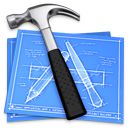Liens directs
Calendrier
| Dim. | Lun. | Mar. | Mer. | Jeu. | Ven. | Sam. |
Apple Store
XML/RSS
Archives
Parcourez les archives par date
Tous les articles 2004
Tous les articles 2005
Tous les articles 2006
Tous les articles 2004
Tous les articles 2005
Tous les articles 2006
RECHERCHE
Liens
Forums
En direct sur
Statistiques
Entrées totales dans ce blog :
Entrées totales dans cette catégorie :
Publié le : mai 01, 2006 01:40 AM
Entrées totales dans cette catégorie :
Publié le : mai 01, 2006 01:40 AM
Réalisé avec
 Xcode vient de subir une cure de jouvence. Cette nouvelle version des outils de développement made in Apple est numérotée 2.1. Et nous savons bien entendu pourquoi la trousse à outils du dévelopeur est remis à jour. C'est tout simplement pour le support de la compilation vers l'architecture à base de processeur Intel qui équipera les futurs ordinateurs Apple.
Xcode vient de subir une cure de jouvence. Cette nouvelle version des outils de développement made in Apple est numérotée 2.1. Et nous savons bien entendu pourquoi la trousse à outils du dévelopeur est remis à jour. C'est tout simplement pour le support de la compilation vers l'architecture à base de processeur Intel qui équipera les futurs ordinateurs Apple. Alors quelles sont les nouveautés
?
Vous pouvez télécharger cette nouvelle version (752,0Mo) en vous inscrivant à l'ADC. C'est gratuit.
What's New
- Xcode 2.1
has substantial changes, enhancements, and bug fixes from Xcode 2.0.
- The project file format is now much more readable and less prone to SCM conflicts. It also supports the new Build Configurations feature. Because of the magnitude of the changes, the project file extension is changed in Xcode 2.1 to “.xcodeproj”. Older versions of Xcode will not read .xcodeproj files, but Xcode 2.1 can convert older project files to .xcodeproj format.
Build Styles are replaced in Xcode 2.1 by Build Configurations, a more "what-you-see-is-what-you-get" approach to target settings. You can set per-configuration settings directly in the target's inspector, and subprojects are built with the same build configuration as the master project.
Built products from different configurations are now built in per-configuration build directories, and can even have different product names per-configuration. That means that building your Release build doesn't overwrite your Debug build any more.
A build configuration can be based on a build configuration file, a text file that provides base settings for one or more configurations. This means that your settings can be viewed, edited, searched, committed to SCM, and even compared as text files.
Dependency analysis is now much more reliable. You don't need to clean before building as often, and files won't be recompiled unnecessarily.
You can configure targets and projects to use Shared Precompiled Headers to minimize the building of precompiled headers.
Xcode now supports Preprocessing Info.plist fIles to perform macro expansion and substitution using common header files.
You can now create targets in your projects that perform Unit Testing of other built products at build time. Using test frameworks for C, C++, and Objective-C, you can report test failures and regressions in newly-built code at the time you build it.
The ability to drag and drop items in Xcode is significantly enhanced. You can now drag any file or folder into any build setting that expects a file path; drag a target into the Target Dependencies list of any aggregate target; and drag groups or file references into build phases.
Distributed builds have been updated to no longer allow remote execution of arbitrary programs. The list of programs that a compile server will allow is contained in /private/etc/compilers.
There are many refinements and additions in the Xcode user interface that will be familiar to users of other IDEs. There’s now a Targets tab in each file inspector to show and set what targets that file is included in. The “Built” column in the Groups and FIles and Details views can now be clicked to Touch a file to cause it to be rebuilt. In the File Editor you can now Unlock a file that is locked in the file system. The Build, Preprocess, and Show Assembly Code commands now work on multiple selections.
The Xcode debugger now supports conditional breakpoints, breakpoint actions, and watchpoints in the debugger interface. The breakpoint actions can log a message, execute a script, speak a phrase, or visualize your program flow in a Class Model diagram.
Viewing variables in the debugger now has extended support for Booleans, Pascal strings, and OSType data types.
The debugger console now performs tab-completion of symbol names in the current context.
Source Code Management now uses an Online/Offline master switch (as is used in Mail) to control connecting and disconnecting from an SCM system. All SCM systems now have basic support for wraper (project files, nibs, model files, RTFD documents, etc.).
The AppleScript dictionary in Xcode continues to grow, in this version adding commands to make new target, upgrade project file, and perform various SCM operations.
- WebObjects
5.3
The WebObjects developer tools are now included with the Xcode Tools. For more information see:
http:// developer.apple.com/releasenotes/WebObjects/index.html
- EOModels can now be edited within Xcode with a new EOModeler plugin that integrates CoreData modeling tools.
WebObjects Builder has UI enhancements and generates HTML 4.0.1 code.
WebObjects Runtime now supports HTML 4.0.1.
NSArray, NSDictionary and NSSet now implement the java.util.Collection interfaces.
Axis 1.1 has been integrated with the Direct To WebServices feature.
WebObjects is qualified against Oracle 10g using the 10.1.0.2 jdbc drivers.
- Automator
- AppleScript action projects can now be debugged using the AppleScript debugger.
A new Automator Shell Script Action project template has been added, allowing the creation of Automator actions using your favorite scripting language.
- gcc
4.0
- Bug fixes to improve stability and correctness.
Synced with the released FSF version.
Vous pouvez télécharger cette nouvelle version (752,0Mo) en vous inscrivant à l'ADC. C'est gratuit.
Thiery


